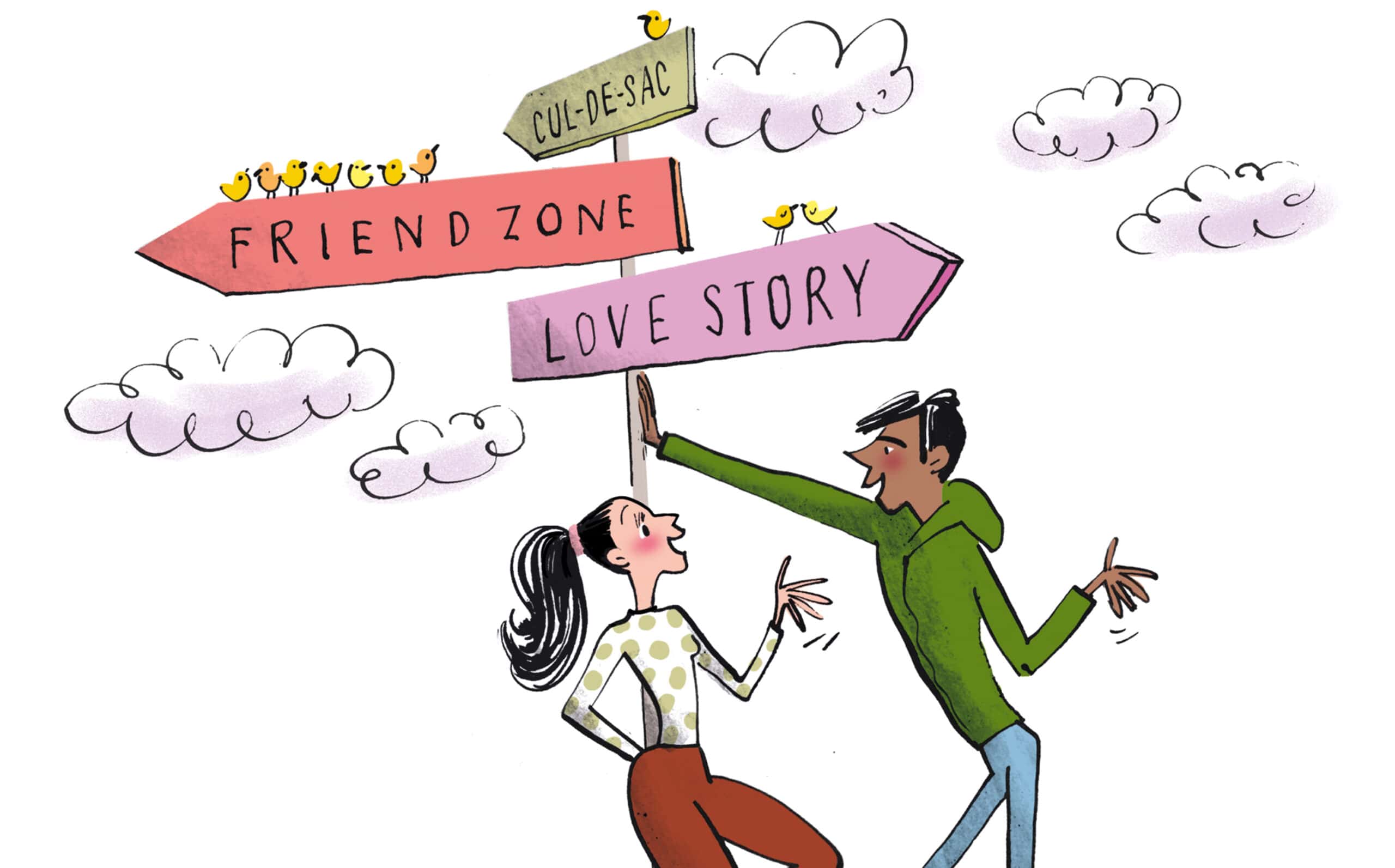I met Cal* during my first week at college. Amid the craziness of freshman orientation, he reminded me of my guy friends back home. He was articulate, laughed easily and was just goofy enough to keep his good looks from going to his head. A group of us hit it off that week, and we bonded over beach trips and study sessions.
As the months passed, Cal and I started talking one-on-one. He made sure I had a ride to our group activities, invited me Christmas shopping—just the two of us—and made sure to sit by me at church. Others started noticing us pairing off, which only confirmed my suspicion that we were nearing “couple” status. Surely, any day he’d ask me to be his girlfriend.
The situation
More months passed, and Cal still acted more-than-friends, but no official question came. Then one day he invited me, and our friend crew, to his house after church. I was eager to meet his mom, a woman I had heard a lot about. I hoped she’d like me—I mean, what if she was my future mother-in-law?
But as she and I talked in her kitchen, two things became super clear: 1) She had no idea that her son and I were, well, whatever we were; and 2) She would be the deciding force in whoever her only son—the pride of her life—pursued, and her standards were a smidge over the moon.
I have a hunch I didn’t meet her expectations for class, beauty or theological pedigree because instead of making “us” official, Cal backed away from me as slowly and casually as he had entered my life. I can laugh about it now, but at the time, I was hurt and confused. I felt like we were breaking up. But since we were never actually dating, I was left with a lot of questions and zero closure.
Can you relate? You like someone and feel there’s more than friendship there, but he never takes the lead to clearly define your relationship. Or maybe you were sure he was going to ask you out, and then you discover he started dating your friend. If you find yourself in the middle of something you’d say is more than casual friendship but not exclusive, then you, my friend, have a situationship on your hands.
Pros and cons
Now before we talk about what to do with a situationship, let me start by saying that not everything about it is bad. Clearly, there’s some wisdom in not getting serious with a guy three minutes after you realize you like him. I’m all for taking time to get to know each other as friends.
Also, situationships can remove some of the pressure—you don’t have to commit to someone before you’re sure you want to. And spending time in groups instead of pairing off also has its benefits. So I can see why situationships happen.
On the other hand, I also understand firsthand why they can be frustrating.
Who wants to be in noncommittal mode indefinitely? And if you’ve talked with your parents and you’re ready for a dating relationship, you might be afraid to tell him you’re ready to commit—in case you’ve misread the cues and inadvertently ruin a friendship. That said, most relationships will have a season between truly “just friends” and something officially more. But with situationships, that season can drag on and on. You deserve better than ambiguity.
If you find yourself straddling the line between friendship and a dating relationship, you may want to consider the following three steps. My hope is that they can help you move from a situationship to a relationship of mutual understanding.
Step 1: Get clarity
A situationship can be confusing. Sometimes that’s because we’re getting mixed signals from the other person. Other times it’s confusing because we hope for more, so we overanalyze every single interaction in light of what we wish them to be. That’s why the first step is to get clarity. When you’re ready to move beyond friendship and start dating, ask yourself these questions:
- What exactly does a teen dating relationship look like to me?
- Am I sure this person is what I’m looking for?
- Why do I think I’m the person he might be looking for?
- What evidence do I have that this person wants to be more than friends?
- Do people I trust agree that he’s acting interested in me as more than a friend?
Step 2: Set boundaries
If you want to move forward in a relationship with someone, start by talking to your parents or another trusted adult about how you’re feeling. Seeking wise counsel can help you protect your heart, body and reputation, especially while you’re in the space between friends and something more. So ask yourself:
- How much time will I choose to spend texting or hanging out with him?
- How deep will our conversations go?
- How much of my story will I share?
- Will we spend time one-on-one or in groups?
- How long am I willing to wait for this friend to clearly define the relationship before I let go of the hope for something more?
Step 3: Communicate clearly
Now it’s time to dig deep and be brave.
If you feel the friendship needs clarity to move forward, I’d recommend talking to him in person. But first, you may find it helpful to write out what you want to say. For practice, consider:
- Explaining what you’ve observed. Example: “I really like you. It seems you like me too because . . .”
- Being honest and specific about what you want. For example, “I’d like to stay friends,” “I’d prefer we get to know each other better” or “I’d like to see if a dating relationship might work out.”
- Sharing your boundaries about relationship expectations. If he needs more time after your conversation to figure it out, that’s OK. But it’s also OK (and healthy) for you to protect your time, emotions and reputation with personal boundaries. Let him know your limits in a kind but clear way.
If you haven’t guessed yet, ending a situationship takes courage, honesty and patience. But after taking these three steps, you can smile at the future. You still might not know what it holds, but you’ll be one step closer to recognizing whether this person is God’s best for you. If he isn’t, letting go will hurt for a bit, but keep your chin up. Trust me, moving on from a situationship can be for the best. After all, you deserve to know when you’re in a relationship.
Are you the one not defining a situationship?
I’ve been on the other side of a situationship too. Once, I had no idea this friend felt more for me until he confessed those feelings rather dramatically. But more often, my thought process about relationships with guys went something like this:
- Hey, it’s fun hanging out with this guy.
- I think he might like me, but I’m not sure.
- Yeah, he definitely likes me, but I don’t feel the same.
- I’ll just keep it chill and avoid “defining the relationship” because I like his company and I don’t want to hurt him.
I share that example for a couple of reasons. First, to acknowledge that guys aren’t the sole instigators of situationships. And second, to help us girls be honest with the guys in our life.
If you’re not sure about whether you’re leading a guy friend on, talk to your parents and trusted friends about the situation. Then ask God to help you honestly answer these questions:
- Am I unsure, or do I know I’m not interested but don’t want to hurt him by telling him the truth?
- Am I waiting on more information to decide if he’s right for me? Or do I have all the info I’ll probably need or get?
- Am I being smart by waiting to commit to a dating relationship or selfish because I don’t want to lose a friend by having this conversation?
- Am I afraid of commitment in general? If so, are those fears rational or unnecessary?
If your answers help you see that you’re inflicting confusion on someone else, be brave and let him move on. The kindest way to define a relationship is honestly.
Is your friend caught in a situationship?
If you’re watching a friend spin her (or his) wheels in a situationship, what can you do to help? It’s amazing how a fresh set of eyes and an impartial opinion can help bring clarity to a confusing situation. You might just be the girl for the job.
If your friend seems open to your perspective, consider using the three steps in this article as talking points. Honest insights and thoughtful questions can help the person sift through the fog of what’s going on and give him or her permission to set boundaries in the relationship. Whether your friend is the one hoping for more or the one dragging things on, you have the unique superpower of helping this individual be brave enough to communicate how he or she is really feeling. Wouldn’t you say that you’re more courageous to do the right thing when you have support—and accountability? After all, that’s what friends are for.




















